|
|
|
Sort Order |
|
|
|
Items / Page
|
|
|
|
|
|
|
| Srl | Item |
| 1 |
ID:
085402
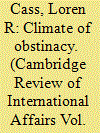

|
|
|
|
|
| Publication |
2008.
|
| Summary/Abstract |
Despite sharing a large number of attributes, Canada and Australia's foreign policy positions in international climate negotiations have varied significantly. Given the similarities in variables affecting climate policy, how do we explain the variation in foreign policy responses to climate change between the two countries? Rational choice and domestic political analyses have failed to fully explain the observed variation. National responses to climate change in Australia and Canada appear to be significantly shaped by ideational forces as well. In particular, political leaders have pursued symbolic climate policies to cultivate national identities for two distinct audiences-international partners and domestic voters. International climate policy positions have been frequently used as communication tools by both states with the resulting climate positions bearing little relationship to each government's domestic climate policies. The Australian and Canadian cases raise important questions regarding the relationship between foreign policy commitments and related domestic policy reforms, which have substantial implications for the effectiveness of global efforts to address climate change.
|
|
|
|
|
|
|
|
|
|
|
|
|
|
|
|
| 2 |
ID:
123105
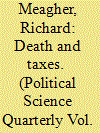

|
|
|
|
|
| Publication |
2013.
|
| Summary/Abstract |
RICHARD MEAGHER describes how and why the estate tax became part of the pro-family agenda of social conservatives. He explores the role of estate tax repeal in maintaining the alliance between economic and social conservatives within the Republican Party.
|
|
|
|
|
|
|
|
|
|
|
|
|
|
|
|
| 3 |
ID:
128740


|
|
|
|
|
| Publication |
2014.
|
| Summary/Abstract |
Despite highly favorable conditions for cooperation, South Korea and Japan have experienced almost constant diplomatic conflict since the end of the Cold War, in large part because of unresolved history disputes. Through the theoretical approach of symbolic politics, I examine the substance of these conflicts and the processes by which specific group identities affect policymaking in and the relationship between the two countries. Based on three case studies I suggest that diplomatic conflicts are the result of identity clashes between a group of Japanese conservative elites and the South Korean public, manifested through the elite-led process of symbolic politics in Japan and the mass-led process in South Korea. These findings help analysts understand the patterns that these conflicts exhibit and assess the prospects for future reconciliation between South Korea and Japan.
|
|
|
|
|
|
|
|
|
|
|
|
|
|
|
|
| 4 |
ID:
187146
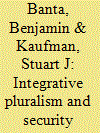

|
|
|
|
|
| Summary/Abstract |
The idea of integrative pluralism offers a promising path for the development of theory in international security and international relations. Instead of either trying to shoehorn all theorising into a single, limited paradigm or giving up entirely on theoretical progress, the integrative pluralist approach calls for bringing diverse approaches together. More precisely, integrative pluralism involves explaining specific phenomena by linking causal processes across multiple layers of reality, and then using the findings to inform broader theoretical constructs such as IR theory paradigms. Elements of the integrative pluralism approach are already visible in the work of mainstream scholars such as Snyder and Katzenstein, as well as of critical scholars such as Sjoberg and Hansen, but the field has tended to overlook these scholars’ efforts at theoretical integration. To more explicitly develop integrative pluralism for our field, this article first draws on critical realist philosophy and social theory. It then illustrates how further steps in this direction might be taken, in particular by highlighting the integrative pluralist aspects of Kaufman's applications of symbolic politics theory to explaining ethnic conflict and war more generally.
|
|
|
|
|
|
|
|
|
|
|
|
|
|
|
|
| 5 |
ID:
146515
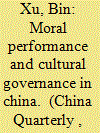

|
|
|
|
|
| Summary/Abstract |
This article examines the Chinese state's moral performance during several major disasters, including the 2008 Sichuan earthquake, the 1998 Yangtze River floods, and the 1976 Tangshan earthquake. Drawing on the theatrical theory of symbolic politics, I argue that the Sichuan earthquake marked a turn in the state's moral performance. While the Chinese state continued to project an image of a secure, heroic state, it endeavoured to construct a sympathetic image through leaders' displays of compassion and sorrow, a mourning ritual for ordinary victims, and narratives of response and rescue. This shift towards a more compassionate performance can be explained by the state's deployment of cultural resources to respond to societal challenges since the new millennium and its effort to repair its image amid the crises of 2008. The compassionate performance was temporarily effective because it found common ground with the traditional political culture of disaster, which still shapes the public's expectations of the state's moral conduct, and the new public culture that values equality and dignity of human life. Nevertheless, the political dilemmas of the compassionate performance became evident. Its efficacy largely relied on the presentation of suffering at the scene, which, however, led to public demands for the state to address the causes of the suffering. When the state failed to construct an “accountable state” image, this “dilemma of scene” had repercussions for its legitimacy. The efficacy of paternalism was also limited because it was less appealing to the growing urban middle class. By addressing moral performance, this paper contributes to the literature on politics of disaster and advances the important research agenda on cultural governance.
|
|
|
|
|
|
|
|
|
|
|
|
|
|
|
|
| 6 |
ID:
192536
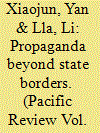

|
|
|
|
|
| Summary/Abstract |
Today, authoritarian states, such as that of China, strive to cultivate political allegiance among their diasporic subjects through state-run propaganda operations beyond national borders. Aiming to construct a stable, exclusive, and institutionalized diasporic network of influence within host societies, autocratic states use extraterritorial propaganda to amass integrative capacity by dispersing carefully tailored discourses, penalizing opposing voices, promoting a unified interpretive framework for conceptualizing socio-political reality, forming a standard meaning system for diasporic communities, coordinating collective action, and forging an integrated patriotic identity through the repetition of codified communication. The early 21st century has witnessed the rise of pro-regime solidarity among diasporic Chinese, a global force buttressing China’s communist regime. In this article, we argue that this unprecedented forging of solidarity is the product of China’s extra-territorial propaganda. The ruling party-state consistently uses concise, catchy, and carefully tailored symbolic resources, such as ‘China insult’ (ruhua) incidents, to extend its political influence beyond national borders. This poses novel challenges to the Westphalian sovereign state. The state’s tactic overseas propaganda operations have facilitated the emergence of an extraterritorial Chinese ‘symbolic state’ that relies on shared symbolism and identity, rather than territorially defined Weberian coercion, to project control over a transnational socio-political domain.
|
|
|
|
|
|
|
|
|
|
|
|
|
|
|
|
| 7 |
ID:
081859
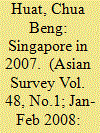

|
|
|
|
|
| Publication |
2008.
|
| Summary/Abstract |
In 2007, the People's Action Party government raised top officials' salaries, already among the highest in the world. Cultural liberalization has finally encouraged the gay community to invoke a seldom used parliamentary process to petition Parliament to repeal the Victorian law that criminalizes homosexuality. The government began to deal with some issues for an impending aging population
|
|
|
|
|
|
|
|
|
|
|
|
|
|
|
|
| 8 |
ID:
158087


|
|
|
|
|
| Summary/Abstract |
Focusing on Smolensk Oblast’, one of the fiercest battlegrounds of both World War II and the Napoleonic War of 1812, this study analyses small-town responses to the Russian government’s ‘City of Military Glory’ war commemoration project implemented in 2006. By examining the ways in which local authorities and local residents redefined identities in the former wartime front region by reinventing local war symbols and reinterpreting local war memories, the article focuses on the central government’s success at mobilising local patriotism from below and the success of local authorities in consolidating local identity using war memories.
|
|
|
|
|
|
|
|
|
|
|
|
|
|
|
|
| 9 |
ID:
137938
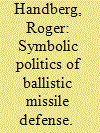

|
|
|
|
|
| Summary/Abstract |
Ballistic missile defense (BMD) politics present an interesting evolution in how the USA, especially Congress, has come to think about BMD both as operational reality and as a symbolic policy. The argument here is that BMD’s operational reality is increasingly overshadowed by its symbolic aspects. Such a status arose from rapidly changing international and domestic politics. The end result is a situation in which BMD policy in a sense floats above the question of its actual combat effectiveness. Its primary mission in part is sustaining US capacity to remain a global power and support its allies.
|
|
|
|
|
|
|
|
|
|
|
|
|
|
|
|
| 10 |
ID:
168551


|
|
|
|
|
| Summary/Abstract |
This article uses Kaufman's symbolic politics theory of ethnic war as the basis for a broader theory integrating most existing insights about the causes of international and civil war. It starts with findings from psychology showing that people are intuitive thinkers whose decisions result less from rational calculation than from symbolic predispositions—biases such as ideology and prejudice. Studies also show that increased feelings of threat lead to increased aggressive attitudes and behavior. Symbolic politics theory explains how individual attitudes can result in collective action using mobilization theory, with social organization and framing by leaders explaining which attitudes become political action. According to symbolist logic, important causes of war include aggressive symbolic predispositions among leaders or mass publics, heightened threat perceptions, and strong political organizations backing aggressive leaders. Crises and enduring rivalries make war more likely because they strengthen hostile predispositions and threat perceptions, thereby promoting mobilization for war. Cooperative transnational ties and democratic political institutions are among the factors that tend to promote peace.
|
|
|
|
|
|
|
|
|
|
|
|
|
|
|
|
| 11 |
ID:
186899
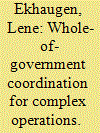

|
|
|
|
|
| Summary/Abstract |
Whole-of-government coordination has produced meagre results if measured against declared aims. However, an assessment of such coordination efforts should include also unstated aims. Based on an in-depth study of the primary high-level coordination body for Norway’s Afghanistan engagement, this article finds that the body was successful in pursuing symbolic politics. Showcasing was an underlying but non-declared aim of the body in question. These findings are significant because they provide an explanation why governments continue to pursue this kind of coordination efforts despite their apparent lack of success. Improved coordination was achieved mostly in terms of information sharing.
|
|
|
|
|
|
|
|
|
|
|
|
|
|
|
|
| 12 |
ID:
118603


|
|
|
|
|
| Publication |
2012.
|
| Summary/Abstract |
As major pillars of collective identity, conventional conceptions of the past play an important role in modern political communities. Public history - distinguished from professional history as official interpretations of past events addressed to a broad public - is a central element of symbolic politics, which is targeted at building collective solidarity and forming an idea of 'We' in society. This aspect of symbolic politics is relevant for constructing all kinds of group identities, but it is particularly crucial in nation-building. Therefore it is not accidental that modern historiography is largely centered on writing histories of nation-states.
|
|
|
|
|
|
|
|
|
|
|
|
|
|
|
|
|
|
|
|
|